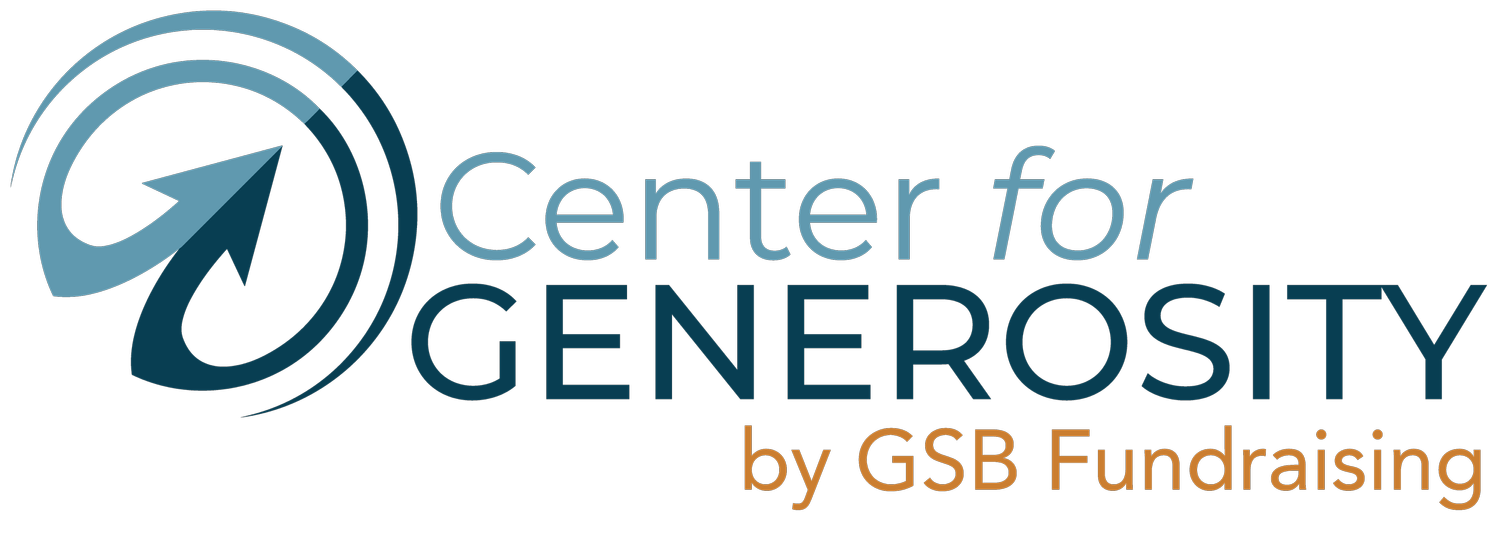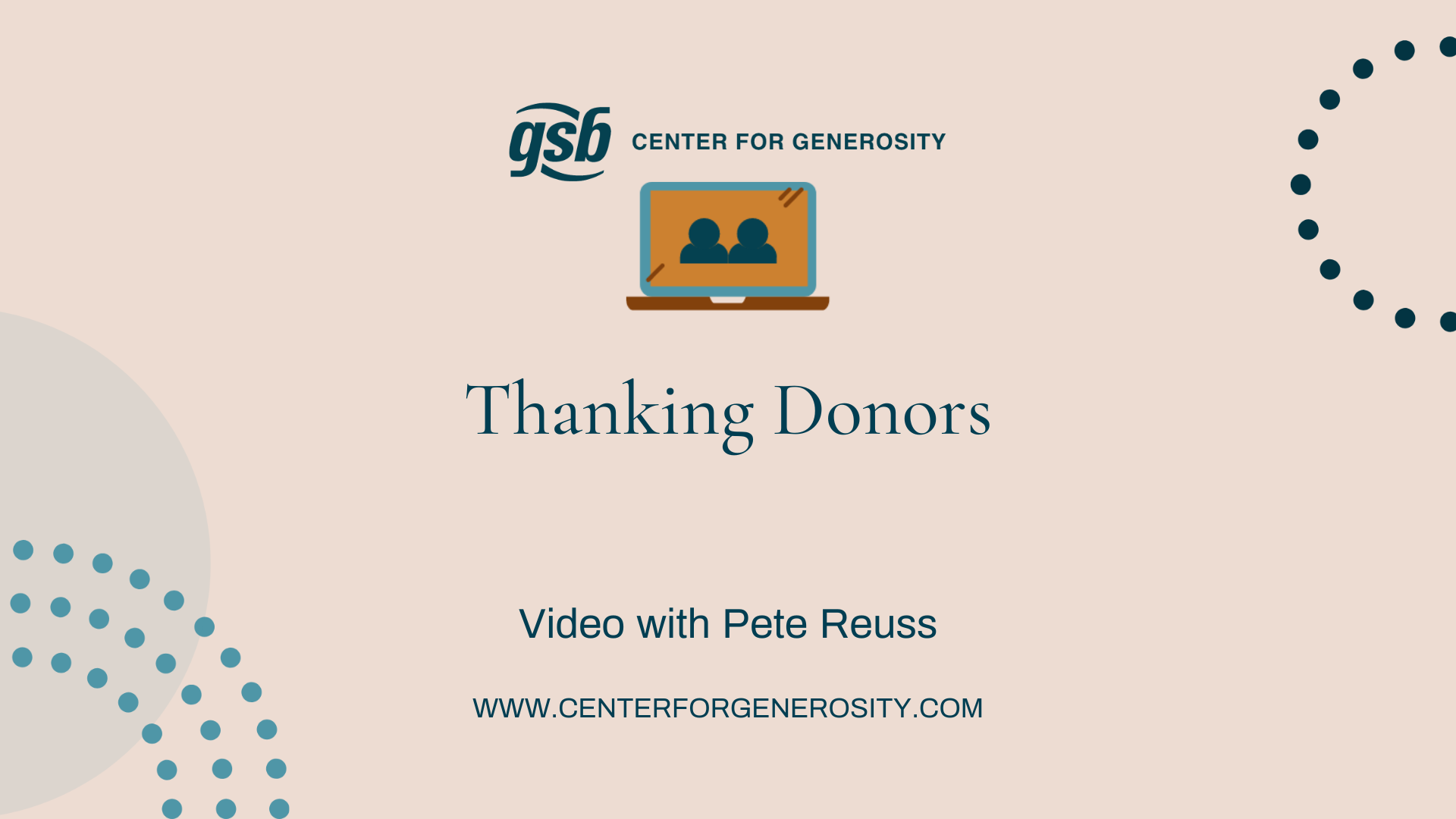Resource Library
Search by Topic
- 10 Steps of Fundraising
- Acknowledgements
- Annual Fund
- Appeal Letters
- Board Governance
- Capital Campaigns
- Case Development
- Challenge Gifts
- Congregation Governance
- Congregations
- Crisis Management
- Database
- Development Councils
- Development Plan
- Donor Relations
- Executive Leadership
- Giving Trends
- Gratitude
- Human Resources
- Lapsed Donors
- Major Gifts
- Marketing
- Matching Gifts
- Mission
- Non-Profits
- Planned Giving
- Public Relations
- Recurring Giving
- Samples
- Self-Care
- Special Appeals
- Special Events
- Stewardship
- Stewardship Appeal
- Storytelling
- Strategic Planning
- The Ask
- Theology
- Tributes
- Volunteers
- Wealth Screen
- Websites
- Youth Fundraising
Preparing Volunteers and Board Members for Major Gift Solicitations
One of the most successful methods to invite gifts in person is to ask a respected board member or other volunteer to join you during the donor visit. Proper preparation is essential for a motivational meeting, however. We will look at how to prepare your volunteer for the visit, and what that visit looks like.
Is Your Website Working for or Against You?
This week we will review how to assess your website for your internal and external audience. When someone visits your website, you have 7 seconds to convince them to keep scrolling. Many organizations and churches built a website and then checked that box. But website interaction is constantly changing and if we don’t keep up, it sends a message that we aren’t current or organized. In this week's round table we will learn how to audit our websites for our different audiences and where content should be included and where it is sending damaging messages.
Build an Ambassador Program to grow your social media footprint
Social media platforms can be an excellent tool to raise awareness about your organization with potential clients, employees, or donors. But with so many messages fighting for attention in our newsfeeds, how can you create traction with your posts – especially if you have a limited or nonexistent digital media budget? Establishing a team of social media ambassadors could be the right solution to help your organization build its social media footprint and reach a bigger audience. Join us to learn more about: The difference between an influencer and an ambassador Identifying and approaching potential partners Levels of formality and setting expectations of ambassadors Quality vs. quantity of social media content
Conducting a Communications Audit
This week we will walk through how to conduct a self-evaluation communications audit to determine what your current messaging is really saying and doing for the level of engagement you receive from your stakeholders. If you wish more people knew, if you feel like people aren’t responding to the content you are sharing, this is for you. How we message and where we message is critical to building engagement as volunteers and donors. These tools can show you where you have room to improve and where you can lean into what you are doing well more deeply. Mitzie will walk you through the tool so you can do the audit yourself.
Segmentation 101
Different audiences care about different things and need different messages. Improved segmentation of communication will improve engagement and response. This session will focus on the basics of segmentation, and strategies your organization can employ today to improve your communications.
Mail Merge 101
No letter or email should begin, "Dear Friend of Our Organization". If we know someone well enough to ask them for a gift, we know them well enough to call them by name. We can also improve their sense of connection by specifically referencing their previous support, passion issues, or other critical factors. But how do you personalize 1,000 letters? In this session, aimed at those who have not done this before, we will teach participants how to do a mail merge, start to finish.
How to make an in person ask
In this session we'll share the best practices for asking for a gift. Whether you've never asked, or just want a refresher, participants will leave this session with new and renewed confidence to invite others to generosity.
Level Up Your Annual Fund
Annual Funds give life to the ongoing work of non-profit organizations. From a very basic framework to a comprehensive annual strategy, developing a robust and effective annual fund makes more mission possible. During this Roundtable session, we’ll talk about annual fundraising strategies that can work for fundraising departments of all sizes. Learn to track important data and develop strategies around donor retention, segmentation, and recurring gifts to boost support to your organization.
Asking donors to level up their Giving
Donors who find a comfortable gift level can stay there for years. Growing the gifts from these donors is key to building a robust giving program. In this Roundtable session, we’ll outline who, how, and when to encourage these givers to grow their giving in greater annual fund support, major or special gifts, and even estate gifts.
Cultivating New Major Donors
Most congregational giving charts include a few people at the top. While this is quite normal, the reality is that a significant number of those giving families come from the older age brackets. Growing a strong base of younger givers will sustain ministry even as some major donors leave the congregation (via death, relocation, or other reason). In this Master Class, Rev. Pete Reuss will provide a practical framework of inviting new families to step into this leadership giving role. It includes cottage meetings, current major givers, and the pastoral staff.
Integrating Direct Mail and Digital Strategies
In fundraising, one size never fits all. Coordinating your fundraising strategies for both direct mail and digital provide the best of both options – and it’s literally how people live in the world. By creating multiple touch points, you improve your stickiness with people who care – or might care – about your organization. Combining strategies also means you’ll raise more money. Isn’t that your goal? In this Roundtable session, learn why integrating these strategies is so impactful and how to do it effectively. You’ll even pick up some tips that you can use in your own fundraising appeals.
Sample Gift Intent Form for Legacy Gifts
Using a gift intent card or form, especially for legacy gifts, can help provide clarity from the donor about their wishes. Because the donor will not be alive to speak about their wishes when the gift is realized, an intent form can help ensure you honor them. It can help the organization plan its budget, and it helps maintain institutional knowledge. Here is a sample you can download and adapt for your own organization.
Board of Directors Self Evaluation
Keeping your Board of Directors healthy and engaged begins with clear expectations. As a rule, board members want to do well and contribute to the mission of the organization. Offering a comprehensive orientation that sets clear expectations and then an annual follow up to allow for accountability can help move board members toward giving their very best. Use the attached document as is or adapt it for your purposes.
Fundraising Writing
From Thank You to Help! What you say – and how you say it – matters. In this session we’ll talk about some of the pitfalls in fundraising writing, differences to consider across various mediums, and how to improve our writing and messaging for better donor engagement. Want to workshop your own written communication? Bring your letter, email, or donor invitation to talk through it together!
Sample Acknowledgement Letter
The letter below is an actual acknowledgment from a client that is story based. When you use a story in your appeal letter, you can match the acknowledgment letter to reflect that and reinforce that their gift transforms lives.
Thanking Donors
Congregations expect their people to give of their time and financial resources and readily share their frustration when people don’t step up. It quickly leads to a narrative of scarcity. There’s just not enough. Yet, at the heart, congregations are volunteer organizations. People willingly show up for worship. They choose to give financial gifts. They share their time. It’s amazing to see. What if we moved from a culture of shame and expectation to a culture of gratitude. It begins with thanking people. In this Master Class, Rev. Pete Reuss will move beyond quarterly reports and provide steps to make people feel appreciated for all they do. People who feel appreciated are more likely to take a further step in their journey of generosity.March Roundtable
Campaigns: Building Your Brand
Campaigns can be powerful opportunities in the life of your organization or ministry when organized well. They require time, energy, and thoughtful planning, but can propel your organization in several ways. In this session we’ll identify opportunities to leverage your campaign to build your brand and brand engagement.
Campaigns: Strengthening Your Ongoing Fundraising
Campaigns can be powerful opportunities in the life of your organization or ministry when organized well. They require time, energy, and thoughtful planning, but can propel your organization in several ways. In this session we’ll explore how your campaign is a powerful opportunity for sharing and enlivening the story of the organization or ministry. We’ll identify opportunities and approaches to telling and sharing your story through a campaign.
Campaigns: Telling Your Story
Campaigns can be powerful opportunities in the life of your organization or ministry when organized well. They require time, energy, and thoughtful planning, but can propel your organization in several ways. In this session we’ll explore how your campaign is a powerful opportunity for sharing and enlivening the story of the organization or ministry. We’ll identify opportunities and approaches to telling and sharing your story through a campaign.
Sample Appeal Letter: Spring Camp
As we continue to navigate the realities of the pandemic, 90%??? of our revenue now comes from the generosity of camp friends like you. You have been a generous supporter of the ministry in the past, and your gift of $200, $100 or even $500 during this time will serve to create that sense of safety and belonging that campers so desperately need right now after all the isolation. Thank you for your ongoing support.




















